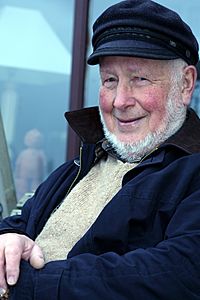Julian Tudor-Hart facts for kids
Quick facts for kids
Julian Tudor-Hart
|
|
|---|---|

Julian Tudor Hart (2007)
|
|
| Born |
Alan Julian Macbeth Tudor-Hart
9 March 1927 London, England
|
| Died | 1 July 2018 (aged 91) |
| Education | University of Cambridge |
| Years active | 1952–2018 |
| Known for | inverse care law |
| Medical career | |
| Profession | doctor |
| Field | general practitioner |
| Research | health inequalities |
Alan Julian Macbeth Tudor-Hart (born March 9, 1927 – died July 1, 2018), known as Julian Tudor Hart, was a general practitioner (GP). A GP is a doctor who provides general medical care for people of all ages. He worked in Wales for 30 years. He is famous for his idea called the Inverse care law. He also did medical research and wrote many books and articles about health.
Contents
Early Life and Education
Hart was born in London, England, on March 9, 1927. His parents were Alexander Tudor-Hart and Alison Macbeth. He studied medicine at Cambridge University and in London. He finished his studies and became a doctor in 1952.
His family had interesting roots. His grandfather changed their family name to Tudor-Hart. Julian Tudor Hart was also a member of the Sigerist Society from 1947 to 1955.
He joined the Communist Party of Great Britain, following his father. He ran for election as a candidate in Aberavon, Wales, in 1964, 1966, and 1970, but he did not win.
Career as a Doctor
In 1961, Julian Tudor Hart moved to Glyncorrwg in Wales. He worked there as a general practitioner for 30 years. He worked with Brian Gibbons, who later became a health minister in Wales.
Hart became very involved in studying health patterns. He worked with famous researchers like Richard Doll and Archie Cochrane. He strongly supported the National Health Service (NHS), which provides healthcare for everyone in the UK. He also believed in socialism, a system where society controls important services. He was even the President of the Socialist Health Association.
He was recognized as a Fellow of the Royal College of General Practitioners (RCGP) and the Royal College of Physicians (RCP). These are important groups for doctors.
Groundbreaking Research
In 2006, Julian Tudor Hart received the first-ever Discovery Prize from the RCGP. This award was given to him because his research inspired many other GPs. His doctor's office in Glyncorrwg was the first in the UK to be recognized as a research practice. This meant they helped test new medical ideas.
He was also the first doctor to regularly check every patient's blood pressure. Because of this, he was able to help reduce early deaths in patients with high blood pressure by 30%. Graham Watt, a professor, praised Tudor Hart. He said that Hart's ideas still guide modern general practice. His work showed how good records, teamwork, and checking results can improve health.
Julian Tudor Hart passed away on July 1, 2018, at 91 years old.
Author and Ideas
Julian Tudor Hart wrote many books and scientific articles. His last book, The Political Economy of Health Care: A Clinical Perspective, looked at how the NHS could be a kind and fair service for everyone. He hoped his book would inspire people to think differently about the future of the NHS.
Hart listed nine important features of the National Health Service when it was first created:
- It was a single national service focused on care for all citizens.
- It was funded by taxes, mainly income tax, and was available to everyone as a "gift."
- Its most important parts were the personal interactions between patients and medical staff.
- Its success could be measured by how much it improved the health of the whole population.
- Staff and units were meant to work together, not compete, to provide the best service.
- Providing continuous care was very important for its success.
- Local staff and people felt a strong connection and loyalty to their local NHS units.
- Many decisions and procedures could not be fully standardized. They involved some uncertainty. This meant they were not like regular products to be bought or sold.
- The NHS needed many people to work in it. New machines always created a need for more skilled staff to use and understand them.
He also wrote many articles about managing high blood pressure and how health services should be organized. His most famous idea is the "Inverse Care Law." He wrote about it in 1971. This law states: "Good medical care tends to be less available where it is needed most." He explained that this happens more when healthcare is treated like a business. It happens less when healthcare is not focused on making money.
See also
 In Spanish: Julian Tudor Hart para niños
In Spanish: Julian Tudor Hart para niños
 | Stephanie Wilson |
 | Charles Bolden |
 | Ronald McNair |
 | Frederick D. Gregory |

